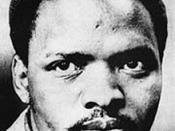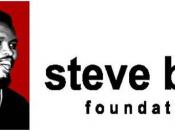The movie, Cry Freedom, is the story of Stephen Biko, a young, influential black activist who was banned and eventually murdered by South Africa's white police authorities. I had never heard of Steve Biko before watching this movie, but the movie did an excellent job of presenting his character and his political views in such a way that really made me learn more about him. The movie portrayed Biko as a very intelligent, articulate, and confident man. I believe he must have been all of these things to have had so many followers as he did. His views on black independence made sense, his actions were justifiable, and his words were great. It's unfortunate that his life was snuffed out in the manner in which it was. But I suppose he was the better man for it. He did not fold; he did not break under the "pressure" (or more appropriately, the torture and mishandling) of his suppressers and compromise his views.
He chose to verbalize his thoughts and feelings, and he ultimately died for them. But his hard work did not go in vain. After his death, his following only became greater and more determined. And for that Steve Biko is a great man.
A great man does not always have to be famous, or notorious. He could be an average, common man, like the main character in the short story, "The Point of No Return." In this story, the main character, Mojabefa, is a man fighting for the same cause as Steve Biko. Although he is not the leader of the cause, he is one of the followers of the cause. Mojalefa possesses the same kind of ambition to rise above the disgrace and the submission of his people. He wants to make a difference, and if that means he has to sacrifice his own personal "freedom" or well being to do this so that another may be free, he will do it. Mojalefa's realization towards fighting for the cause is well illustrated in the lines in which he states, "Unlike my father, I was not going to be blindfolded and led along a garden path by someone else, a foreigner from other continents. I learned that as a black, there was a responsibility I was carrying on my shoulders as a son of this soil. I realized that I had to take an active part in deciding (or in insisting I should decide) the path along which my decedents will tread. Something was wrong: radically wrong, and it was my duty as a black person to try and put it right. To free myself and my people became an obsession, a dedication" (201). It is this obsession that makes Mojalefa a great man too. All these two men wanted was freedom for their people.





